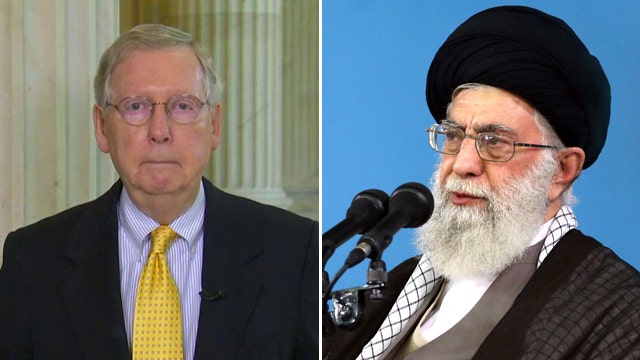Mitch McConnell: Democrats to blame for Iran nuke deal
Senate majority leader blasts Senate Democrats for blocking vote on resolution disapproving agreement: 'Let's make sure we know who we ought to be angry at'
Senate Democrats voted to uphold the hard-fought nuclear accord with Iran on Thursday, overcoming ferocious GOP opposition and delivering President Barack Obama a legacy-making victory on his top foreign policy priority.
A disapproval resolution for the agreement fell two votes short of the 60 needed to move forward as most Democratic and independent senators banded together against it. Although House Republicans continued to pursue eleventh-hour strategies to derail the international accord and Senate Republicans promised a re-vote, Thursday's outcome all but guaranteed that the disapproval legislation would not reach Obama's desk.
As a result the nuclear deal will move forward unchecked by Congress, an improbable win by Obama in the face of unanimous opposition from Republicans who control Capitol Hill, GOP candidates seeking to replace him in the Oval Office and the state of Israel and its allied lobbyists in the U.S.
Beginning next week, Obama will be free to start scaling back U.S. sanctions to implement the agreement negotiated by Iran, the U.S. and five other world powers. The accord aims to constrain Iran's nuclear ambitions in exchange for hundreds of billions of dollars in relief from international sanctions.
"This vote is a victory for diplomacy, for American national security and for the safety and security of the world," the president said in a statement. "Going forward, we will turn to the critical work of implementing and verifying this deal so that Iran cannot pursue a nuclear weapon."
Frustrated Republicans railed against Democrats for using a procedural vote to block final passage of the disapproval resolution, and issued grim warnings about a deal they contend could serve only to enrich Tehran and leave it closer to building a bomb when constraints begin to ease in 10 or 15 years. They promised that Thursday's vote would not be the Senate's last word, and moments after it was over Senate Majority Leader Mitch McConnell set the stage for another next week.
"No amount of saying this issue is over makes it over," McConnell declared, adding that if a Republican wins the White House next year, "I say to Iranian observers of the debate, (the deal) will be looked on anew."
But Democrats led by Minority Leader Harry Reid of Nevada promised that any further votes would have the same outcome "and are just simply a waste of time."
"People around the world should know today's outcome was clear, decisive and final," Reid said.
In the House, Republicans had not given up on blocking the deal against all odds. After backtracking on plans to vote on the disapproval resolution when it began to look short of support in the Senate, House Republicans lined up votes on several related measures.
Late Thursday they agreed on a party-line 245-186 vote to a measure specifying that Obama had not properly submitted all documents related to the accord for Congress' review, and therefore a 60-day review clock had not really started.
That will be followed Friday by votes on a bill to approve the accord — which is doomed to fail, but Republicans want to force Democrats to go on record in favor of the agreement — and on a measure preventing Obama from lifting congressionally mandated sanctions on Iran.
"This debate is far from over, and frankly, it's just beginning," said House Speaker John Boehner, R-Ohio. "This is a bad deal with decades-long consequences for the security of the American people and our allies. And we'll use every tool at our disposal to stop, slow, and delay this agreement."
Underscoring the fierce politics, the National Republican Senatorial Committee sent out press releases within moments of the Senate vote criticizing Democratic senators for their votes.
Some House Republicans, buoyed by a favorable ruling this week in a lawsuit they filed over Obama's health care law, have begun suggesting a lawsuit to stop the accord. Boehner called that "an option that is very possible."
Yet the House Republican maneuvers seemed to have little chance of bearing results, and White House officials sarcastically branded them the "Tortilla Coast Gambit," a reference to a Capitol Hill restaurant where tea party lawmakers plan their moves. Even before the Senate voted, White House Press Secretary Josh Earnest was boasting of the administration's success.
"Look, if we were sitting here just a month ago, back in mid-August, talking about how things would be resolved in Congress ... and I told you that neither house of Congress would pass a resolution of disapproval for this agreement, you'd be shocked," Earnest said. "That's an indication of the kind of progress that we've made."
In fact, opponents never had much chance of blocking the deal on Capitol Hill, partly because of a complicated congressional review process that gave unusual power to Democratic minorities in the House and Senate who could secure a win for Obama simply by upholding his veto of a disapproval resolution. Yet it was widely expected in the days after the nuclear deal was signed July 14 that Obama would have to use his veto pen.
Despite poll numbers showing significant public concern about the agreement, opposition never seemed to catch fire among Democrats or voters over the summer. In the end, instead of registering unified opposition to the deal, congressional Republicans turned the debate into the latest occasion for infighting within the party and between the House and Senate.













































